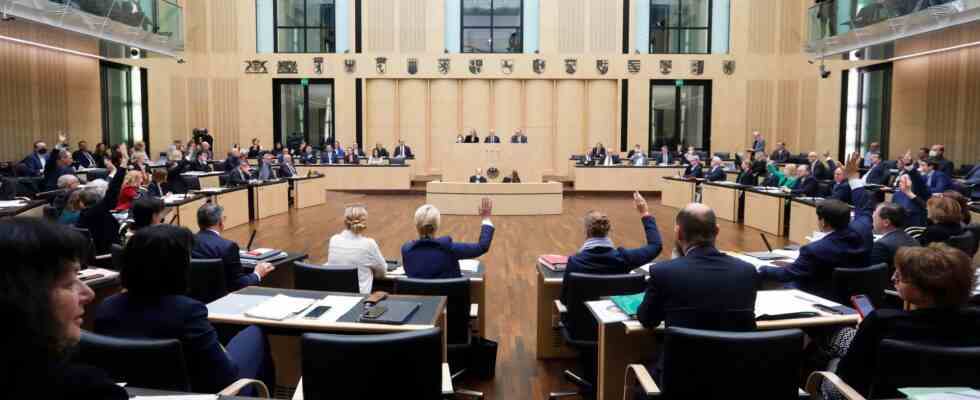Status: 11/25/2022 1:19 p.m
Citizens’ income will be introduced in Germany in the coming year. It replaces the previous Hartz IV system. After the Bundestag, the Bundesrat also approved the social reform. The Federal Employment Agency assured a smooth transition.
At the beginning of the year, the new citizens’ allowance can replace the previous unemployment benefit II, known as Hartz IV. After the Bundestag, the Bundesrat also approved the social reform with a large majority at midday. In the state chamber, countries with government participation in the Union also voted for the reform that the traffic light coalition of SPD, Greens and FDP had launched. The law is finally passed. In the Bundesrat, the traffic light coalition is also dependent on votes from countries in which the Union is involved in government for the required majority.
compromise in the mediation committee
The Bundestag had previously approved a compromise by the mediation committee of the Bundestag and Bundesrat with 557 votes in favor, 98 against and two abstentions. In addition to the government factions SPD, Greens and FDP, the Union also voted for it. AfD and Linke voted against it.
With the compromise reached in the federal-state committee on Wednesday evening, the requirements for people receiving citizen income were tightened somewhat compared to the coalition’s original plans. Violations of the obligation to cooperate can now be sanctioned from the start with benefit cuts. The amount of one’s own assets, which those receiving basic income do not have to touch initially, and the length of the waiting period during which the appropriateness of an apartment and the amount of assets are not checked have also been reduced.
Higher standard rate, more training
For those affected, the monthly payments will be significantly increased from the beginning of the year. A single adult will then receive 502 euros per month, which is 53 euros more than before. Couples and children also receive more money. In October, 5.33 million adults and children were entitled to Hartz IV payments. This also includes refugees from Ukraine. The federal budget for 2023 earmarks around 44 billion euros for citizen income.
The conversion of the unemployment benefit II introduced under Red-Green in 2005 into a citizen’s benefit is intended to focus on qualification and further training in order to place more unemployed people in permanent employment. These parts of the reform are scheduled to come into force on July 1st.
“Magnificent Moment of Democracy”
In the Bundesrat, Saxony-Anhalt’s Prime Minister Reiner Haseloff (CDU) called the agreement reached a “great hour of democracy”. He emphasized the German system, which is based on balance and a willingness to compromise. Hesse’s Prime Minister Boris Rein (CDU) also praised the “quick result that transcended party lines”. The referral to the mediation committee has nothing to do with a blockade, he emphasized. Despite sometimes widely differing ideas, it was possible to “work out a good compromise that takes different interests into account”. Citizens’ income will “bring a noticeable improvement for many people in Germany”.
The Prime Minister of Rhineland-Palatinate, Malu Dreyer (SPD), called the abolition of mediation priority as the “most important point” for her. This gives those affected “the right and the opportunity” to qualify and even do an apprenticeship. Mecklenburg-Western Pomerania’s Prime Minister Manuela Schwesig (SPD) said to the CDU/CSU that the debate in recent weeks had “unfortunately been poisoned”. The assertion had been made that work was no longer worthwhile with the citizen’s income. “That’s not true,” stressed Schwesig. In a social state, work must always be worthwhile, and that would have been the case with the original draft of the traffic light parties.
Federal Minister of Labor Hubertus Heil (SPD) referred to the core of the welfare state in the state chamber, that it is always about “protection and opportunities”. This principle could be renewed with the citizen money, said Heil.
“Hartz IV is history”
At the debate in the Bundestag, the parliamentary manager of the SPD parliamentary group, Katja Mast, spoke of the largest social reform in decades: “Hartz IV is history.” The parliamentary director of the Union faction, Thorsten Frei (CDU), emphasized that the Union had achieved in the mediation process that the basic principle of demanding and promoting was adhered to. His colleague from the FDP, Johannes Vogel, explained that he had succeeded in “making a good law even better”.
The deputy chairwoman of the left-wing faction, Gesine Lötzsch, justified her faction’s rejection by saying that the increase in the standard rate was too low and that the core of the Hartz IV system would be retained. The parliamentary director of the AfD parliamentary group, Götz Frömming, accused the Union and the traffic light parties of “Gekungel” in the mediation committee.
Federal agency sees itself prepared
The Federal Employment Agency (BA) assured that the citizen’s allowance would be paid out on time from January. “We now have clarity and can get started. We will pay out the increased standard rates punctually at the turn of the year,” said the responsible director of the federal agency, Vanessa Ahuja. No new application is necessary for the citizen money, she emphasized. “Anyone who receives benefits from the job center beyond the turn of the year will automatically be paid the higher standard rate.”
The BA board member explained that the basic income is an important reform, which also incorporates the experience of the Federal Agency over the past 17 years. “Our tool box is getting bigger when it comes to funding opportunities.”

